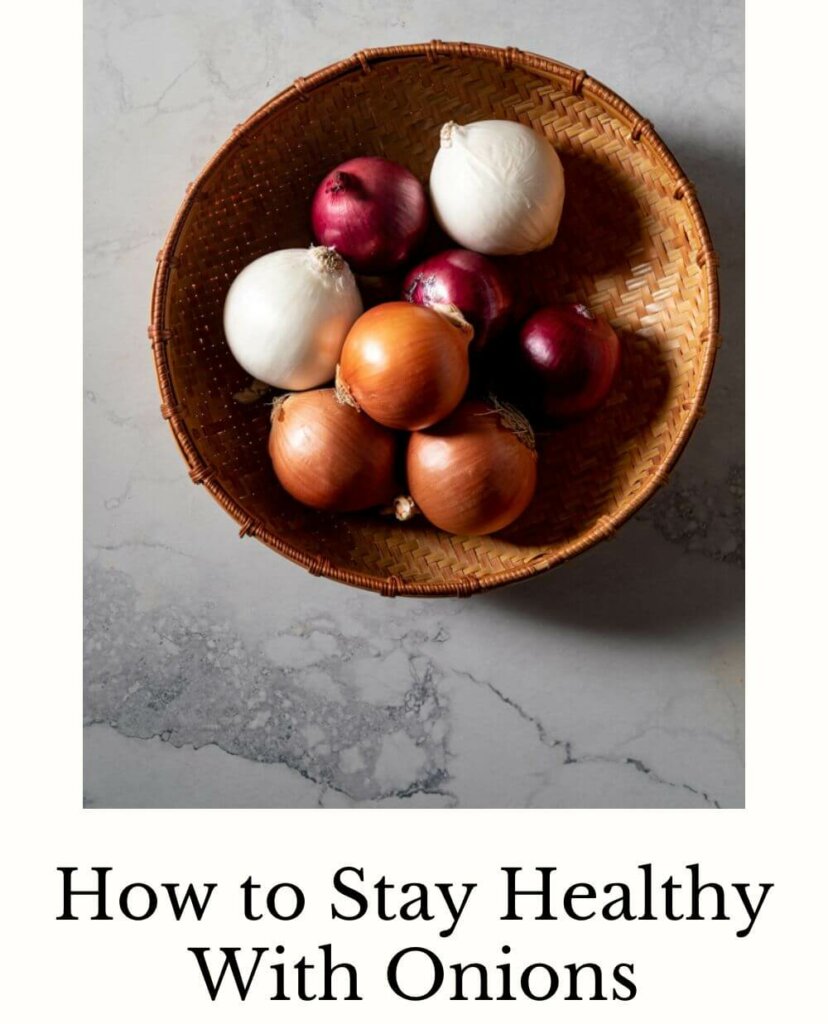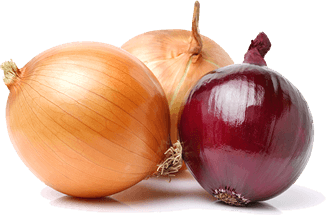 We want to make sure you have the most accurate, research-based information about onions, so we’ve shared the myths around onions preventing illness before. But just because there are some old wives’ tales about onions and the flu that still circulate, it doesn’t mean that the onion isn’t full of beneficial nutrients and compounds that can keep us well. Making onions a regular part of a nutritious eating plan can help you stay healthy this winter and beyond.
We want to make sure you have the most accurate, research-based information about onions, so we’ve shared the myths around onions preventing illness before. But just because there are some old wives’ tales about onions and the flu that still circulate, it doesn’t mean that the onion isn’t full of beneficial nutrients and compounds that can keep us well. Making onions a regular part of a nutritious eating plan can help you stay healthy this winter and beyond.
Onions, reduced inflammation, and protection against disease
Inflammation is a natural, protective response by the immune system when it encounters illness, infection, and stress. It’s when this response is triggered over and over again, or it lasts for prolonged periods of time that it begins to impact our health. This prolonged inflammation is called chronic inflammation, and it can result in the damage of healthy cells.
Chronic inflammation can be linked to an unhealthy lifestyle, and it may eventually lead to the development of chronic diseases such as heart disease, diabetes, Alzheimer’s disease, and some cancers. The good news is that an anti-inflammatory diet may help.
Nutrient-rich foods with fiber and phytochemicals are part of an anti-inflammatory diet and onions are an anti-inflammatory food. Research shows that eating anti-inflammatory foods may help reduce the inflammation that is linked to an increased risk for chronic disease.
Onions have superpowers that can help fight unhealthy inflammation in the body. It’s why we like to call them Nature’s Ninja. Onions promote a healthy digestive system that is linked to reduced inflammation, they contain high levels of the beneficial flavonoid, quercetin, and organosulfur compounds that give onions their aroma and flavor. Quercetin is an anti-inflammatory and linked to reduced risks for heart disease and some cancers. Studies have shown that eating allium vegetables, including onions and garlic, may reduce the risks of both colorectal and breast cancers. The organosulfur compounds are also anti-inflammatory and have been found to reduce the risk for heart disease and stroke.
Onions and a healthy gut
The impact of a healthy gut, our digestive system, on our physical health is often underestimated, but research continues to build indicating just how important gut health is to our overall wellbeing. Our gastrointestinal systems are full of bacteria that work with immune cells in support of a healthy immune system. Research shows that what we eat influences the presence of healthy bacteria in our guts and therefore the health of our immune systems. Onions contain nutrients that support a healthy gut.
Fructans are a group of carbohydrates in onions that play a major role in maintaining gastrointestinal health. The fructan inulin, a soluble dietary fiber that is found in onions, has undergone research with results linking it to gut health. Inulin provides benefit to gut health as a dietary fiber, but what makes it even more powerful is that it is a prebiotic. Prebiotics feed the bacteria in our guts keeping them balanced and healthy. Different prebiotics benefit health in specific ways, but overall, due to their role in gut health, prebiotics have been linked to improved calcium absorption, improved immune system, and an increase in good bacteria while decreasing disease causing bad bacteria. Research shows there may even be a link between prebiotics and brain functions such as mood changes.
Onions are available and affordable all winter long
Smart shopping for the most nutrient dense foods available is important for your physical health, and also your financial health and peace of mind. There is no better food to help you stick to your shopping budget than onions. They provide health-boosting nutrients at an affordable price, they can easily be worked into recipes, they have a longer shelf life than many vegetables, and they are available all year long. During the winter months, storage onions make preparing healthy home cooked meals much easier. This time of year, red onions are ideal for eating raw as a topping or condiment, or they are delicious roasted. White onions can also be used in raw preparations or try sauteing them. Yellow onions are a good fit for sauteing, caramelizing, roasting, or baking.
Onions are a good fit for winter recipes
Winter months bring cooler temperatures that call for comfort foods. The deeply caramelized flavors of baked or roasted onions and the sweetness onions add to a simmered soup make them a perfect fit for winter meals.
For an easy weeknight dinner, French Onion Chicken has all the flavors of your favorite soup in an easy and healthy meal. Speaking of soup, what could be better for a winter lunch? Our Chunky Southwestern Soup will fill you up with hearty vegetables and warming spices. Meatloaf is a winter recipe staple and our Oniony Meatloaf shouldn’t be missed. If you are looking for a meat-free main course, it doesn’t get any better than these Roasted Onions Stuffed with Lentils, Feta and Prunes.
Onions can make a side dish all on their own with recipes such as our Pan Fried Onion Slices or our Roasted Onions with Herb Butter Sauce. Raw onions shouldn’t be overlooked in colder months when they complement the season’s produce like in this winter Escarole Salad with Oranges and Red Onions.
Onions also make the best baked goods and breads. Serve Walla Walla Sweet Onion Upside-Down Cornbread with a bowl of your favorite chili. Savory Onion Dried Cherry Scones can be served with brunch or enjoyed as an afternoon snack.
Whether it’s a warming soup, a filling casserole, or a roasted side dish, onions add flavor and nutrition to your diet while keeping you well throughout the winter and in the months to come.
References:
Diet Review: Anti-Inflammatory Diet, Harvard School of Public Health




